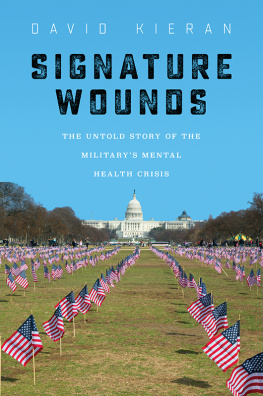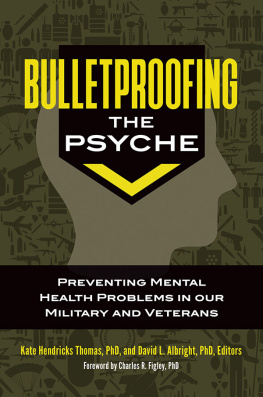2018 Stphane Grenier
All rights reserved. No part of this work covered by the copyrights hereon may be reproduced or used in any form or by any meansgraphic, electronic, or mechanicalwithout the prior written permission of the publisher. Any request for photocopying, recording, taping or placement in information storage and retrieval systems of any sort shall be directed in writing to Access Copyright.
Printed and bound in Canada at Marquis. The text of this book is printed on 100% post-consumer recycled paper with earth-friendly vegetable-based inks.
Cover and text design: Duncan Campbell, University of Regina Press
Copy editor: Ryan Perks
Proofreader: Kristine Douaud
Indexer: Sergey Lobachev, Brookfield Indexing Services
Cover art: Portrait of Stphane Grenier by Philip Cheung, www.philipcheungphoto.com.
Library and Archives Canada Cataloguing in Publication
Grenier, Stphane, 1965-, author
After the war : surviving PTSD and changing mental health culture / Stphane Grenier with Adam Montgomery.
Includes bibliographical references and index.
Issued in print and electronic formats. ISBN 978-0-88977-533-6 (softcover).ISBN (PDF).ISBN 978-0-88977-535-0 (HTML)
1. Grenier, Stphane, 1965- Mental health. 2. Grenier, Stphane, 1965-. 3. SoldiersMental healthCanada. 4. SoldiersMental health servicesCanada. 5. VeteransMental healthCanada. 6. VeteransMental health servicesCanada. 7. Traumatic neuroses. 8. Mental health servicesCanada. 9. Mental health promotionCanada. I. Montgomery, Adam, 1982-, author II. Title.
RC552.P67G74 2018 616.85210092 C2017-906786-9 C2017-906787-7
University of Regina Press, University of Regina Regina, Saskatchewan, Canada, s4s 0a2 tel: (306) 585-4758 fax: (306) 585-4699 web: www.uofrpress.ca
We acknowledge the support of the Canada Council for the Arts for our publishing program. We acknowledge the financial support of the Government of Canada. / Nous reconnaissons lappui financier du gouvernement du Canada. This publication was made possible with support from Creative Saskatchewans Creative Industries Production Grant Program.
Acknowledgements
I wish to start by expressing my gratitude to my family. A special and heartfelt thanks first and foremost to Julie, my partner and strongest supporter for over three decades. My son, David, and my daughter, Vronique, gave me the strength to carry on when I was at my lowest. I have been so proud to watch them grow up and become great Canadians. My granddaughter, Zora, occupies a special place in my heart, and represents for me the generation that I hope will enjoy the fruits of our hard work transforming the mental health system.
From my time in the Canadian Armed Forces I want to thank John Blouin for the long days, dedication, and friendship he gave me during and after our time in Rwanda. David Snashall was a great friend and his joie de vivre inspired me on many missions abroad. Joel Brayman deserves special thanks for being the first to recognize that I wasnt well after my return from Rwanda. Michel Arsenault was my first peer supporter, and he gave me the perspective I needed to get help. Thanks to Chris Corrigan for his unconditional support as my commander in Toronto. Chris was a stellar leader and friend, and his empathy allowed me to start on my path to recovery. Christian Couture, may he rest in peace, provided me with the soil to sow the seeds of peer support in the Canadian military, and I will be forever grateful for his kind, compassionate leadership. Rick Noseworthy excelled as the first OSISS peer supporter and was also a great friend throughout my career, and beyond. Thanks to Marc Godfrey for keeping both me and my staff grounded during our formative years delivering peer support to the military.
Christian McEachern was a great sounding board; he deserves many thanks for being the soldier who made me realize just how much peer support was needed in the Canadian Forces. David Wrather was a great boss and leader as I created OSISS ; he took a big risk trusting in our vision. Thanks, David. Dr. Don Richardson was the first psychiatrist to believe in my idea and in the OSISS program, and he has been a trusted friend and colleague ever since. I must also mention Jim Woodley, whom I pulled out of retirement to be my right-hand man in managing the program. Kathy Darte of Veterans Affairs Canada was a voice of reason, someone who worked hard to create acceptance of my non-clinical vision. Jim Jamiesons tireless efforts helped us convince clinicians at the Department of National Defence that peer support was beneficial for their patients. Sophie Richard worked, and still works, tirelessly with military families, and she helped me to expand the OSISS program to those who also carry the consequences of military service. Marianne LeBeau kept the program rooted for many years, and helped OSISS stay within its founding mission. Lastly, I wish to extend my thanks to the entire OSISS teampast, present, and future. Your important work has changed so many lives for the better. You are all true heroes.
A quick word of thanks to my former colleagues on the Mental Health Commission of Canadas Workforce Advisory Committee. They supported my vision of peer support, and I am very grateful for that.
I also wish to acknowledge my friends and colleagues at Peer Support Accreditation and Certification Canada, as well as those in the civilian mental health sphere. I am thankful to Dr. Ian Arnold for all his hard work and friendship, and for his helpful insights and commentary during the production of this book. Dr. Rachel Thibault has been a tireless worker in the cause of peer support, and I am blessed to have her as a colleague. Annette and Vital Ducharme have given countless volunteer hours to the cause. Dr. Jayne Barker was a supporter and believer in our work, and she went to bat for us as we pushed peer support beyond its former boundaries within the Mental Health Commission. Thanks to the late Diana Capponi and all the other peer supporters across Canada who allowed me to better understand the challenges faced by ordinary Canadians trying to access the mental health system. Thanks also to the past, present, and future board members of PSACC for their tireless dedication to starting and sustaining a new charitable organization. My most heartfelt thanks go to Kim Sunderland for taking on the daunting challenge of being our first executive director. Shaleen Jones also deserves mention for accepting to lead our charity through some difficult times.
Sincere thanks also go out to my colleagues at Mental Health Innovations, Kim Sunderland, Marie-Jose Michaud, Leslie Bennett, and Jon OConnor, who are great innovators . I am also very grateful to Richard Dixon and Lyne Wilson, at NAV Canada, for giving myself and MHI its first big break, and for understanding how peer support can enhance Canadian workplaces. Special thanks to Dr. Linda Courey and the Nova Scotia Health Authority for committing to community peer support at the provincial level. Thanks also to Lauren Scott for accepting the challenge of managing a complex program, and to our present and future peer supporters.














